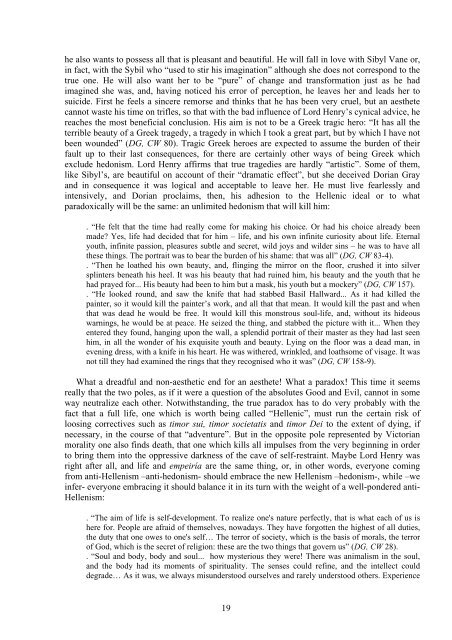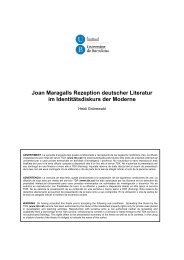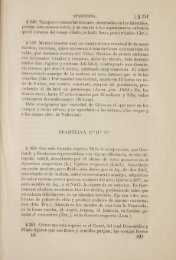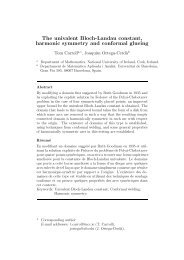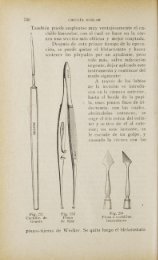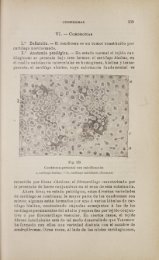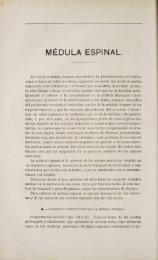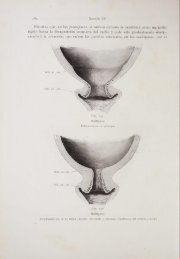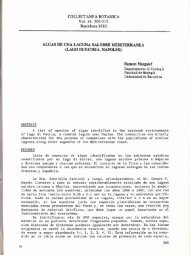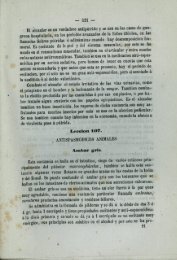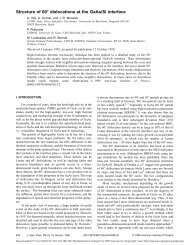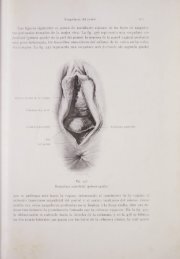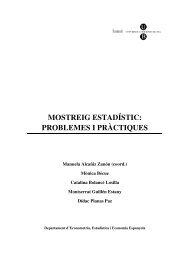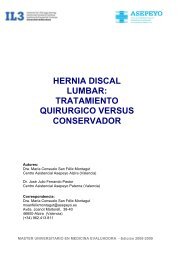Wilde Parsa ang_12080.pdf - Dipòsit Digital de la UB - Universitat ...
Wilde Parsa ang_12080.pdf - Dipòsit Digital de la UB - Universitat ...
Wilde Parsa ang_12080.pdf - Dipòsit Digital de la UB - Universitat ...
You also want an ePaper? Increase the reach of your titles
YUMPU automatically turns print PDFs into web optimized ePapers that Google loves.
he also wants to possess all that is pleasant and beautiful. He will fall in love with Sibyl Vane or,<br />
in fact, with the Sybil who “used to stir his imagination” although she does not correspond to the<br />
true one. He will also want her to be “pure” of ch<strong>ang</strong>e and transformation just as he had<br />
imagined she was, and, having noticed his error of perception, he leaves her and leads her to<br />
suici<strong>de</strong>. First he feels a sincere remorse and thinks that he has been very cruel, but an aesthete<br />
cannot waste his time on trifles, so that with the bad influence of Lord Henry’s cynical advice, he<br />
reaches the most beneficial conclusion. His aim is not to be a Greek tragic hero: “It has all the<br />
terrible beauty of a Greek tragedy, a tragedy in which I took a great part, but by which I have not<br />
been woun<strong>de</strong>d” (DG, CW 80). Tragic Greek heroes are expected to assume the bur<strong>de</strong>n of their<br />
fault up to their <strong>la</strong>st consequences, for there are certainly other ways of being Greek which<br />
exclu<strong>de</strong> hedonism. Lord Henry affirms that true tragedies are hardly “artistic”. Some of them,<br />
like Sibyl’s, are beautiful on account of their “dramatic effect”, but she <strong>de</strong>ceived Dorian Gray<br />
and in consequence it was logical and acceptable to leave her. He must live fearlessly and<br />
intensively, and Dorian proc<strong>la</strong>ims, then, his adhesion to the Hellenic i<strong>de</strong>al or to what<br />
paradoxically will be the same: an unlimited hedonism that will kill him:<br />
. “He felt that the time had really come for making his choice. Or had his choice already been<br />
ma<strong>de</strong>? Yes, life had <strong>de</strong>ci<strong>de</strong>d that for him – life, and his own infinite curiosity about life. Eternal<br />
youth, infinite passion, pleasures subtle and secret, wild joys and wil<strong>de</strong>r sins – he was to have all<br />
these things. The portrait was to bear the bur<strong>de</strong>n of his shame: that was all” (DG, CW 83-4).<br />
. “Then he loathed his own beauty, and, flinging the mirror on the floor, crushed it into silver<br />
splinters beneath his heel. It was his beauty that had ruined him, his beauty and the youth that he<br />
had prayed for... His beauty had been to him but a mask, his youth but a mockery” (DG, CW 157).<br />
. “He looked round, and saw the knife that had stabbed Basil Hallward... As it had killed the<br />
painter, so it would kill the painter’s work, and all that that mean. It would kill the past and when<br />
that was <strong>de</strong>ad he would be free. It would kill this monstrous soul-life, and, without its hi<strong>de</strong>ous<br />
warnings, he would be at peace. He seized the thing, and stabbed the picture with it... When they<br />
entered they found, h<strong>ang</strong>ing upon the wall, a splendid portrait of their master as they had <strong>la</strong>st seen<br />
him, in all the won<strong>de</strong>r of his exquisite youth and beauty. Lying on the floor was a <strong>de</strong>ad man, in<br />
evening dress, with a knife in his heart. He was withered, wrinkled, and loathsome of visage. It was<br />
not till they had examined the rings that they recognised who it was” (DG, CW 158-9).<br />
What a dreadful and non-aesthetic end for an aesthete! What a paradox! This time it seems<br />
really that the two poles, as if it were a question of the absolutes Good and Evil, cannot in some<br />
way neutralize each other. Notwithstanding, the true paradox has to do very probably with the<br />
fact that a full life, one which is worth being called “Hellenic”, must run the certain risk of<br />
loosing correctives such as timor sui, timor societatis and timor Dei to the extent of dying, if<br />
necessary, in the course of that “adventure”. But in the opposite pole represented by Victorian<br />
morality one also finds <strong>de</strong>ath, that one which kills all impulses from the very beginning in or<strong>de</strong>r<br />
to bring them into the oppressive darkness of the cave of self-restraint. Maybe Lord Henry was<br />
right after all, and life and empeiría are the same thing, or, in other words, everyone coming<br />
from anti-Hellenism –anti-hedonism- should embrace the new Hellenism –hedonism-, while –we<br />
infer- everyone embracing it should ba<strong>la</strong>nce it in its turn with the weight of a well-pon<strong>de</strong>red anti-<br />
Hellenism:<br />
. “The aim of life is self-<strong>de</strong>velopment. To realize one's nature perfectly, that is what each of us is<br />
here for. People are afraid of themselves, nowadays. They have forgotten the highest of all duties,<br />
the duty that one owes to one's self… The terror of society, which is the basis of morals, the terror<br />
of God, which is the secret of religion: these are the two things that govern us” (DG, CW 28).<br />
. “Soul and body, body and soul... how mysterious they were! There was animalism in the soul,<br />
and the body had its moments of spirituality. The senses could refine, and the intellect could<br />
<strong>de</strong>gra<strong>de</strong>… As it was, we always misun<strong>de</strong>rstood ourselves and rarely un<strong>de</strong>rstood others. Experience<br />
19


